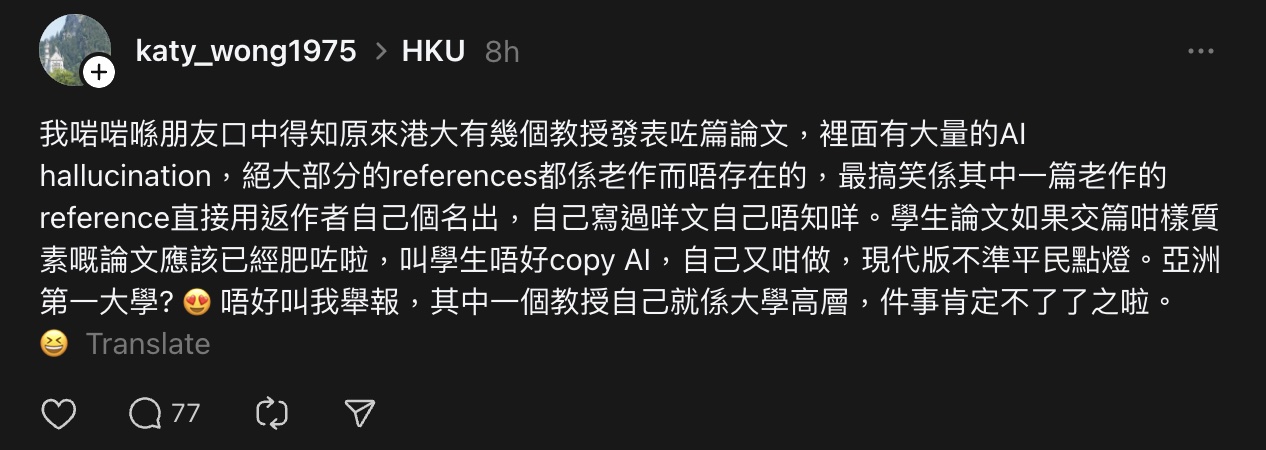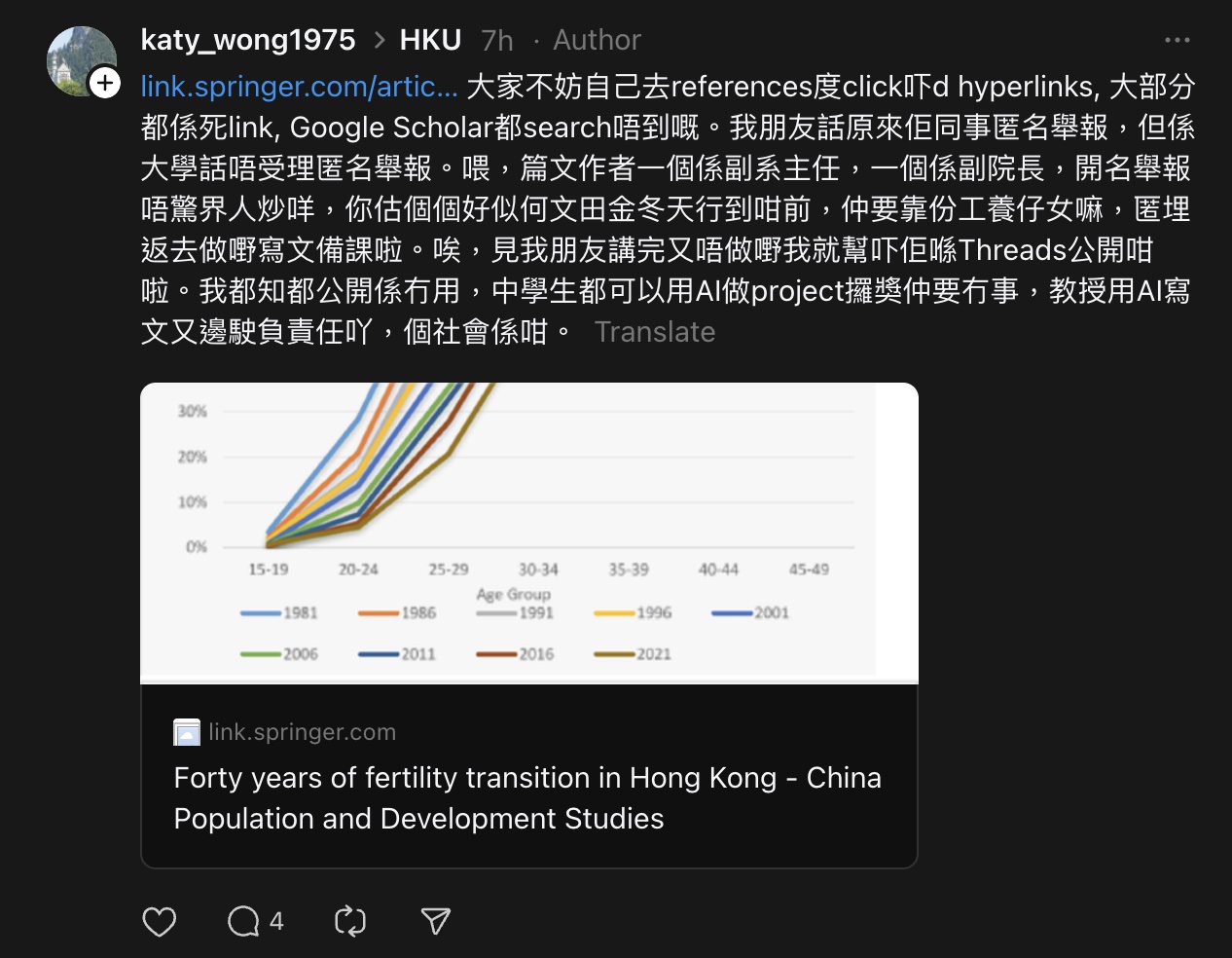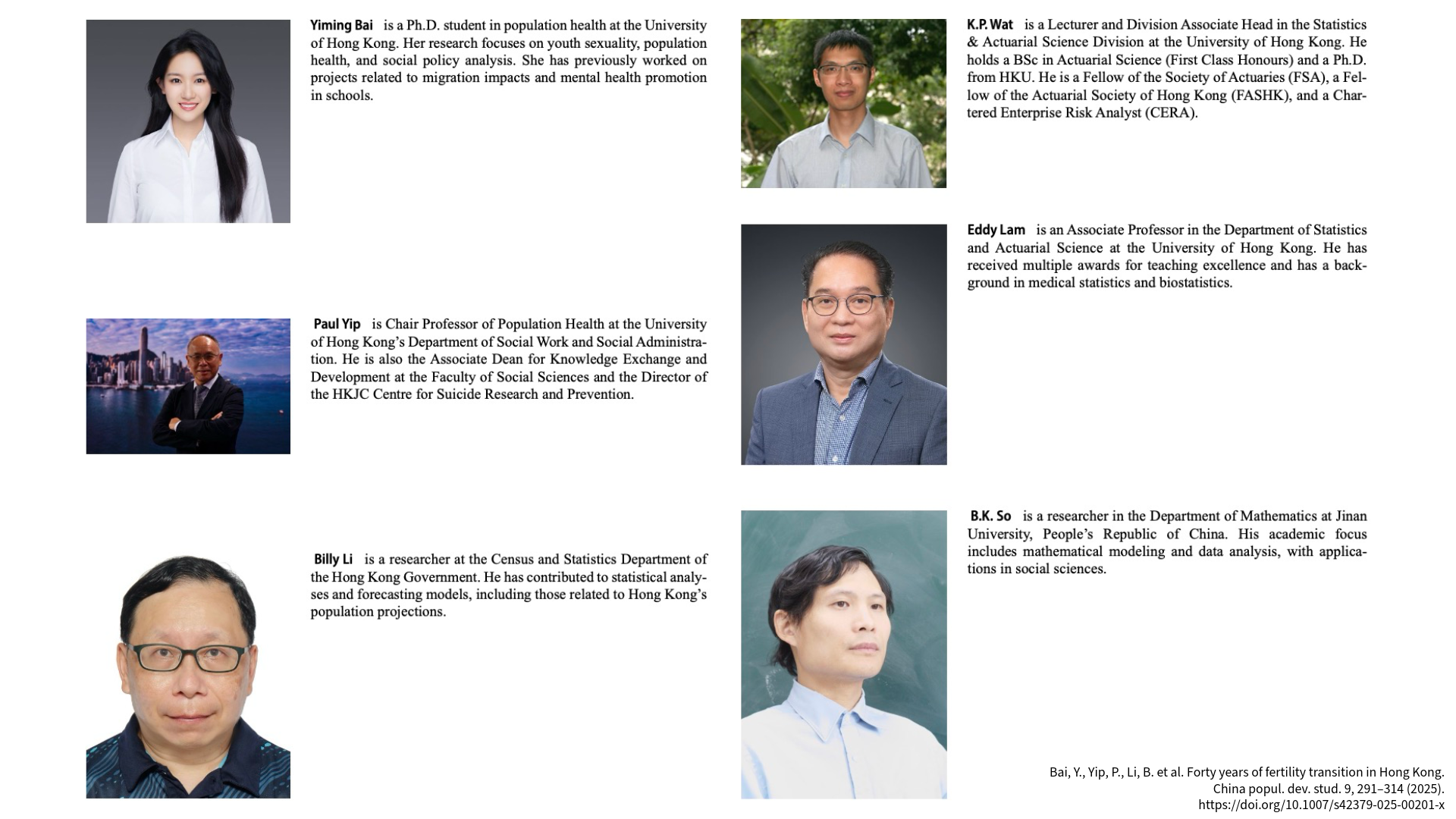Global News
Exclusive | Four HKU Academics Caught with 40% Fabricated Citations in Published Paper
Threads user claims AI was used to fabricate references in Springer-published fertility study involving four University of Hong Kong academics
10 MIN READ
By Matthew H.
Published:
| Updated:
HONG KONG — A recently published academic paper co-authored by four University of Hong Kong faculty members is under scrutiny after social media users discovered that approximately 40% of its citations appear to be completely fabricated, raising serious questions about research integrity at Hong Kong's flagship institution.
The paper, titled "Forty years of fertility transition in Hong Kong," was published in October 2025 in the Springer journal China Population and Development Studies (DOI: 10.1007/s42379-025-00201-x). Independent verification by The Once Times reveals that out of 49 hyperlinked references, 20 citations (40.8%) are completely non-existent — with DOIs that do not resolve and sources that cannot be found in any academic database — while 3 additional citations (6.1%) link to entirely different articles on unrelated topics.

The issue first came to public attention on Friday evening when Threads user @katy_wong1975 posted about the discovery at approximately 4:49 PM HKT on November 7, 2025. "A friend told me that several HKU professors published a paper with massive AI hallucination," the post read in Cantonese. "The vast majority of references are fabricated and don't exist. Most hilariously, one of the fabricated references is attributed to the author himself — he doesn't even know what he's written."

Four HKU Authors Involved

The paper lists six authors, four of whom are affiliated with the University of Hong Kong:
Prof. Paul Yip (corresponding author) — Chair Professor of Population Health, Department of Social Work and Social Administration; Associate Dean for Knowledge Exchange and Development at the Faculty of Social Sciences; Director of the HKJC Centre for Suicide Research and Prevention
Yiming Bai — Ph.D. student in Population Health
Dr. K.P. Wat — Lecturer and Division Associate Head in the Statistics & Actuarial Science Division
Dr. Eddy Lam — Associate Professor in the Department of Statistics and Actuarial Science
The remaining two authors are Billy Li from the Hong Kong Census and Statistics Department, and B.K. So from Jilin University in China.
Professor Yip's senior position as Associate Dean and suicide prevention center director makes the alleged misconduct particularly significant for HKU's reputation in research integrity.
Systematic Pattern of Fabrication
The Once Times conducted systematic verification of all 49 hyperlinked references in the published article. The investigation revealed a disturbing pattern: while 26 citations (53.1%) are legitimate academic sources, the remaining 23 citations are either completely fabricated or incorrectly attributed.
Among the fabricated citations are several that falsely attribute non-existent publications to the authors themselves. For example, the paper cites "Chen, F., & Yip, P. S. F. (2017a). The effects of delayed marriage on fertility in Hong Kong. Journal of Family Issues, 38(10), 1350–1370" — a source that does not exist in any academic database, despite being attributed to co-author Professor Yip.
Other fabricated citations include numerous recent studies on Hong Kong fertility that appear designed to support the paper's arguments but cannot be verified. Examples include citations attributed to researchers named "Cheng, Y." appearing in multiple 2020-2021 publications that do not exist, and several DOIs that simply do not resolve when accessed.
The three incorrectly attributed citations are perhaps even more revealing. One citation claims to reference "Goldstein, J. R., et al. (2003). The impact of educational attainment on fertility in Hong Kong" with DOI 10.1080/00324728.1970.10406132, but that DOI actually links to a 1970 article titled "Religious fertility differentials in Thailand, 1960" by Sidney Goldstein — a completely different topic, time period, and geographic location.
Anonymous Response Raises More Questions
Approximately one hour after the issue gained traction on social media Friday evening, an anonymous Threads account with zero followers and zero posts — username @cccl_68 — posted a response acknowledging the problem.
"Thank you for the discussion we are aware of the situation and we have informed the editor of the journals of the mistakes," the account stated. "The inconsistency of the references in the paper will be rectified and a corrected version will be uploaded to the journal website as soon as possible. The inconsistency is caused by using the AI to fix up the references. We apology for any inconvenience caused to the readers and the journal."
The response raises significant questions: Who is operating this account? Do they represent the authors, the university, or the journal? And why is such a serious academic integrity issue being addressed through an unverified social media account rather than official institutional channels?
The claim that "AI was used to fix up the references" appears to be an admission that artificial intelligence tools were employed in manuscript preparation, potentially generating non-existent citations — a practice that, if not disclosed during peer review, would constitute serious research misconduct under most academic standards.
Institutional Response Concerns
According to @katy_wong1975's follow-up post on Threads, a colleague attempted to report the issue anonymously to the university but was told that HKU "does not accept anonymous reports."

"One of the authors is an associate department head, another is an associate dean," the post noted. "Reporting with your real name — aren't you afraid of being blacklisted? You think everyone can be as bold as Ho Man Tin's Kim Dong Tian? People still need their jobs to support their children. So they quietly go back to work, write papers, and prepare lessons."

The post continued: "My friend talked about it but didn't do anything, so I'm helping by making it public on Threads. I know going public is useless too — even secondary school students can use AI to do projects and win awards without consequences. Why should professors using AI to write papers be held accountable? That's just how society is."
The University of Hong Kong's "Policy on Research Integrity" explicitly prohibits fabrication, defined as "making up data or results and recording or reporting them." The policy states that "members of the university should report to the authorities concerned any suspected research misconduct" and provides whistleblower protection, stating that "staff members or students who in good faith report a concern or participate in the investigation of a case of research misconduct shall be protected from retaliation or adverse consequences."
However, the policy document available on HKU's website does not explicitly address whether anonymous reports are accepted or rejected.
Broader Context: AI and Academic Publishing
This case emerges amid growing concerns about AI-generated content in academic publishing. In August 2025, Springer Nature retracted a machine learning textbook after investigators discovered that approximately one-third of its citations were fabricated or contained grave errors — a pattern remarkably similar to the 40.8% fabrication rate found in this Hong Kong fertility paper.
The use of AI tools to generate academic references has become an increasing concern in scholarly publishing, as large language models can confidently produce plausible-sounding citations that do not actually exist — a phenomenon sometimes called "AI hallucination." However, researchers are expected to verify all sources before submission, and failure to do so constitutes a serious breach of academic integrity standards.
The Once Times has archived the original article and all references on the Internet Archive Wayback Machine for independent verification.
As of publication time, neither the University of Hong Kong, Springer Nature, nor any of the named authors have issued official statements through institutional channels. The article remains published on the Springer website without corrections or retraction notices.
Questions about research integrity, institutional accountability, and the role of AI in academic work remain unanswered. Whether this case will result in formal investigation, retraction, or disciplinary action remains to be seen.
The Once Times has reached out to the University of Hong Kong Research Services, Springer Nature, and the named authors for comment. This story will be updated as developments emerge.
Appendix: Complete List of Problematic Citations
FABRICATED CITATIONS (20 total — sources do not exist):
Bianchi, S. M. (2000). "The changing role of women in the family: Implications for fertility." Journal of Marriage and Family, 62(1), 1–12.
Brinton, M. C. (2019b). "The impact of social stigma on non-marital births in Hong Kong." Asian Population Studies, 15(1), 1–20. DOI: 10.1080/17441730.2018.1491234
Chan, K. W. (2018). "The role of marital fertility rate in influencing Hong Kong's total fertility rate." Journal of Population Studies, 42(1), 45–67.
Chan, K. W., & Cheung, A. (2021). "The impact of women's education on fertility in Hong Kong." Asian Population Studies, 17(1), 1–20. DOI: 10.1080/17441730.2021.1923812
Chen, F., & Yip, P. S. F. (2017a). "The effects of delayed marriage on fertility in Hong Kong." Journal of Family Issues, 38(10), 1350–1370. (False self-citation)
Cheng, Y. (2020). "Changes in fertility levels and societal shifts in Hong Kong post-2015." Asian Population Studies, 16(3), 345–362.
Cheng, Y., & Leung, K. (2021). "The effectiveness of family-friendly policies in Hong Kong: A critical review." Social Policy Review, 12(3), 201–220.
Cheng, Y., & Lo, A. (2021). "The impact of non-marital births on fertility trends in Hong Kong." Demographic Research, 45(2), 123–140.
Cheng, Y., & Tam, H. (2020). "Attitudes towards non-marital childbearing in Hong Kong." Family Relations, 69(4), 1025–1040.
Hofferth, S. L., & Iceland, J. (1998). "Social networks and social capital: The role of family and community in childbearing decisions." Population Research and Policy Review, 17(4), 345–367.
Kearney, M. S., & Levine, P. B. (2015). "Economic conditions and nonmarital fertility among young women." Journal of Population Economics, 28(1), 1–24.
Lai, M. (2020). "The erosion of traditional family support systems in Hong Kong." Journal of Family Issues, 41(5), 678–695.
Lee, J. (2020). "Work-life balance policies in Hong Kong: Challenges and opportunities." International Journal of Human Resource Management, 31(5), 645–661.
Manning, W. D., & Smock, P. J. (2002). "Alternative family structures: A demographic and social perspective." Journal of Marriage and Family, 64(1), 1–12.
Sobotka, T. (2017). "Post-transitional fertility: The role of childbearing postponement." Journal of Population Research, 34(4), 327–349. DOI: 10.1007/s12546-017-9197-y
Stuart-Basten, S. (2019). "Gender roles and family dynamics in Hong Kong." Asian Journal of Women's Studies, 25(1), 1–20. DOI: 10.1080/12259276.2019.1571234
Sullivan, E., et al. (2016). "The role of reproductive technologies in fertility trends." Reproductive Health, 13(1), 1–10. DOI: 10.1186/s12978-016-0174-5
Wang, F., Zhang, Y., & Chen, L. (2020). "Comparative analysis of fertility trends in East Asia: Lessons from Hong Kong." Asian Journal of Population Studies, 6(1), 15–30.
Wong, C. (2022). "The cost of living in Hong Kong: Implications for family planning." Asian Economic Policy Review, 17(2), 234–250.
Chan, K. W. (2018). [Second instance] Journal of Population Studies article
INCORRECT/MISATTRIBUTED CITATIONS (3 total — DOIs link to different articles):
Goldstein, J. R., et al. (2003). "The impact of educational attainment on fertility in Hong Kong." Population Studies, 57(3), 325–335. DOI: 10.1080/00324728.1970.10406132
Claimed topic: Hong Kong fertility and educational attainment
Actual article linked: "Religious fertility differentials in Thailand, 1960" by Sidney Goldstein
Klüsener, S. (2015). "The role of non-marital fertility in fertility transitions: A cross-national analysis." Demographic Research, 32, 1–30. DOI: 10.4054/DemRes.2015.32.1
Claimed topic: Non-marital fertility in fertility transitions
Actual article linked: "Is Buddhism the low fertility religion of Asia?" by Vegard Skirbekk, Marcin Stonawski, Setsuya Fukuda, Thomas Spoorenberg, Conrad Hackett, Raya Muttarak
Lee, J. (2021). "Financial constraints and fertility intentions in Hong Kong." Population and Development Review, 47(3), 555–578. DOI: 10.1111/padr.12412
Claimed topic: Financial constraints and fertility in Hong Kong
Actual article linked: "Frank H. Knight on Inheritance and Social Continuity"
Note: All citations can be independently verified by accessing the article here.
(archived at The Wayback Machine, an initiative of the Internet Archive here.)



